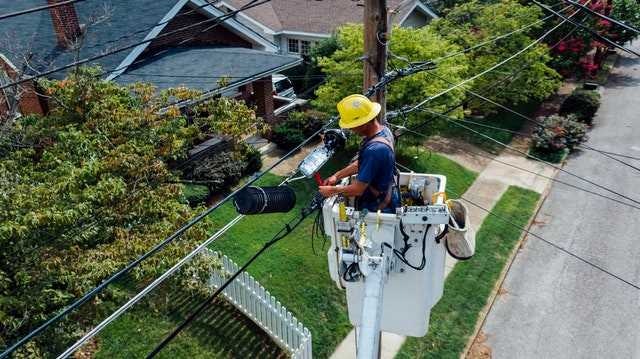Electrical & Mechanical Engineering Apprenticeships
All products and services featured are independently selected by WikiJob. When you register or purchase through links on this page, we may earn a commission.
- Why You Should Consider an Engineering Apprenticeship
- Who Can Apply for an Engineering Apprenticeship?
- What Will Happen on an Engineering Apprenticeship?
- Tips for Finding an Engineering Apprenticeship
- 10 of the UK’s Best Engineering Apprenticeships
empty
empty
empty
empty
empty
empty
empty
empty
empty
empty
- Final Thoughts
Mechanical engineers design solutions to mechanical problems and analyze, manufacture and maintain mechanical systems. These can include power-producing machines (like generators and turbines), as well as the mechanical components of buildings such as air-conditioning systems, lifts and escalators.
Electrical engineers design, install, maintain and repair electrical systems in industrial, commercial and domestic environments.
To succeed as a mechanical or electrical engineer you will need to have an active interest in how things work and demonstrate excellent problem-solving skills to be able to design, test and build tomorrow’s technology.
Usually, a good honours degree is required for entry into these areas of engineering. You can also work your way into the industry via an apprenticeship, which will help you gain the skills, knowledge and professional qualifications required.
Below, we cover ten of the best such apprenticeships.

Why You Should Consider an Engineering Apprenticeship
There are many roles that a mechanical or electrical engineer might consider, all with different requirements and qualifications. Becoming a mechanical or electrical engineering apprentice allows you to ‘earn and learn’ while you discover where your interests lie.
Completion of an apprenticeship will mean you are fully qualified without the costs of a university degree, and you may be offered a job to start straight after the apprenticeship ends.
You may gain experience in a globally recognised business and even have the opportunity to travel.
If you aren’t offered a job when you qualify, you will still have three or four years of work experience to boost your CV.
Areas in which you might work could include:
- Aerospace
- Automotive
- Electrical equipment
- Electronics
- Marine
- Mechanical engineering
- Metals
- Nuclear engineering
Engineering roles can be obtained a number of different ways, including more academic routes; many colleges and universities have diploma and degree courses. It should be noted that diploma and degree courses often require higher grades and incur fees.
Who Can Apply for an Engineering Apprenticeship?
Anyone who is eligible to work in the UK and is over the age of 16 can apply for an apprenticeship. You cannot be in full-time education, although you can make your application while you’re still at school.
Some employers only offer apprenticeships to over-18s for health and safety reasons.
The specific entry requirements will depend on the level of apprenticeship:
-
Level 2 – This is the most basic engineering apprenticeship and is the equivalent of five GSCEs. It takes 12 to 24 months to complete, after which you are awarded an NVQ Level 2 and/or a BTEC National Certificate in engineering. It usually leads to a more advanced apprenticeship or diploma.
-
Level 3 – An A-Level equivalent program that requires at least five GCSEs. These should include Maths, English and one science. Completion of this apprenticeship will result in an NVQ Level 3.
-
Higher: Level 4–6 – These are post-A-Level and require either a completed level 3 apprenticeship, a relevant BTEC qualification or at least two A-Levels. Higher-level apprenticeships usually last three to four years. You could achieve a Higher National Certificate (HNC), a Higher National Degree (HND), a Bachelor of Science or a Bachelor of Engineering degree, depending on the provider.
-
Higher: Level 7 – This the top-level apprenticeship and will gain you an MEng or similar qualification. As a rule, you must complete previous levels to be considered for a level 7, though you may be able to apply if you have a relevant degree.
If you have a specific career path in mind, you should ensure you complete a recognised qualification. It is worth checking that the qualification offered at the end of the apprenticeship is suitable.
What Will Happen on an Engineering Apprenticeship?
Apprentices work for at least 30 hours a week and around 30 weeks a year. Time is split between learning practical work skills and working towards an engineering qualification.
Some apprenticeships will be work-based four days a week, with the fifth spent in a local college learning the theory behind the more practical day-to-day work.
Other apprenticeships will involve spending blocks of four to six weeks at a college or educational establishment, or the first year of the course might be in full-time education.
Salaries are typically between £9,000 and £28,000 depending on apprenticeship, age and location. Salaries increase after qualification.
Tips for Finding an Engineering Apprenticeship
Apprenticeships are government-funded, so a good place to start when looking for an apprenticeship is the government website.
Search by category, keyword and location to narrow down potential options.
Companies will usually list apprenticeships on their recruitment pages and you can apply directly. Consider which businesses might be the best or most appropriate in your chosen field, and then look to see what opportunities they are offering.
10 of the UK’s Best Engineering Apprenticeships
1. RAF
The RAF has been nationally recognised as one of the UK’s top major apprenticeship employers. It was awarded Macro Employer of the Year in the 2017 National Apprenticeship Awards and offers 23 apprenticeships across a wide variety of fields.
Apprentices are guaranteed a job after qualification, although they will also have to commit to a minimum period of working with the RAF, as well as have a high level of fitness.
For all applications, the following selection criteria are applied:
- Be aged 16 to 47 years old
- UK citizen or dual UK/other nationality
- Commit to a minimum of three years with the RAF
- Pass the Airman Selection Test
- Pass a general fitness test
Roles include:
- Cyberspace communications specialist – Unified Communication Technician Level 3 Advanced Apprenticeship
- Aircraft technician – Level 3 Advanced Apprenticeship in Engineering Technician
- Vehicle and mechanical equipment technician – Advanced Apprenticeship in Engineering
- Communications infrastructure technician – Network Cable Installer Advanced Apprenticeship, which includes an industry-standard Level 3. Candidates will be expected to complete a specialist interview which includes a climbing aptitude test at RAF Digby, Lincolnshire
- General technician, Electrician, Weapon technician – Advanced apprenticeship in engineering manufacture
- Survival equipment specialist – Level 3 Survival Equipment Specialist Apprenticeship
Entry Requirements: GCSE grade 4 (C) or equivalent, or SCE Standard Grades at grade 2/Scottish National 5 (grade A to C) in English language, Maths and an approved science/technology-based subject.
2. Ford
Ford offers several advanced and higher mechanical engineering apprenticeships:
Advanced
- Entry Requirements: Three GCSE grades (or their equivalent) including English at grade C or above, Maths at grade B or above, and physics or double science at grade C or above.
- Qualification Gained: NVQ Level 2, NVQ Level 4
Higher
- Entry Requirements: Minimum of five GCSEs (or equivalent) at grade B or above, to include Maths, English and double science and have, or are predicted to gain, three A-Levels or equivalent at grades B or above, to include Maths, physics and one other science, engineering or technology subject.
- Qualification Gained: BEng in Mechanical Engineering
3. Boeing
Boeing is the world's largest aerospace company and leading manufacturer of commercial jetliners, defence, space and security systems, and a service provider of aftermarket support.
Boeing offers apprenticeships across various areas:
- Aircraft maintenance – Three-year apprenticeship
- Aircraft fabrication – Three-year Level 3 apprenticeship or five-year degree apprenticeship
- Flight services – Two-year apprenticeship gaining, for example, a Level 3 NVQ Extended Diploma in Engineering Maintenance
Entry Requirements: Engineering or electrical BTEC (Level 2) essential, or equivalent.
4. IBM
IBM offers apprenticeships from Level 3 to Level 6. Degree-level apprenticeships are delivered in partnership with the University of Exeter and Manchester Metropolitan University – depending on business needs – and require one day a week at university and full-time work during university vacations.
Salaries start at £20,000.

5. BMW
Apprenticeships at BMW last between 1.5 and four years; training leads to an NVQ Level 3 qualification.
A four-year graduate apprenticeship in engineering is also offered, leading to an honours degree in engineering.
6. Network Rail
Network Rail offers a three-year Level 3 engineering apprenticeship for those who are 18 and above, and who meet fitness criteria suitable for outdoor work.
Entry Requirements: Four GCSEs at grade 5 to 9 (A* to C), including English language, Maths and science, or NVQ/BTEC Level 2 or above in an engineering subject.
7. EDF Energy
EDF Energy has the following engineering apprenticeships available:
Engineering Maintenance Apprenticeship
This is a four-year programme, at the end of which you will be awarded a Maintenance and Operations Engineering Technician Apprenticeship Certificate and BTEC Level 3.
Entry Requirements: Five GCSEs at grade C or above (or grade 4 and above), National 5 (or equivalent), including Maths, English and two science or technical subjects.
Nuclear Engineering Degree Apprenticeship
A four-year course that pays £17,335 a year with annual pay increases, after which you’ll be awarded a degree and have four years of relevant work experience.
Entry Requirements: Three A-Levels (grade C or above), including Maths and science, or a relevant Level 3 qualification, such as a BTEC Level 3.
8. BT
BT offers several engineering apprenticeships:
- Electronics Technician Level 3 – Train with the team that maintains communications systems.
- Radio & Rigging Technician Level 3 – Work as part of a team that controls BT’s radio and rigging infrastructure. Part of this training involves learning to climb radio towers and masts.
- Power Technician (Maintenance and Operations Engineering Technician) Level 3 – Learn to work with electrical and mechanical power systems.
Entry Requirements: Five GCSEs at grade 4 to 9 (C or above) including English language and Maths.
9. Siemens
Siemens offers the following apprenticeships relevant to engineering:
Advanced:
- Mechanical engineering
- Electrical/electronic engineering
- Manufacturing
- Mechatronics
- Engineering maintenance
- Rail engineering – Design
- Rail engineering – Technician
These are three- to four-year courses with the first year in full-time study. At the end, you will be awarded an NVQ Level 3, plus a technical engineering qualification.
Entry Requirements: A minimum of four GCSEs (or equivalent) at grade 4 or above, including Maths, English and science.
Higher:
- Mechanical engineering
- Electrical/electronic engineering
- Manufacturing
- Rail engineering
- Control/technical support engineering
These are two- to four-year courses, at the end of which you’ll be awarded an NVQ Level 4 and a relevant HNC.
Entry Requirements: BTEC National Certificate or A-Levels in a relevant discipline/s.
Degree:
- Control/technical support engineer
- Engineering
- Digital and technology solutions
These take up to five years to complete and you’ll be awarded an NVQ Level 6-7, equivalent to a Bachelor's or Master's degree.
Entry Requirements: BTEC National Certificate/A-Levels in a relevant discipline/s.
10. HMGCC
Her Majesty's Government Communications Centre offers the following three-year apprenticeships in electronics and mechanical manufacturing:
- BTEC Level 2 foundation competence
- BTEC Level 3 development competence
- BTEC Level 3 development technical knowledge
Salaries start at £17,768, with annual increases.
Entry Requirements: Four GCSEs or equivalent at grade 9 to 4 (A* to C), including Maths, English and science or a technical-based subject, such as engineering or product design, or relevant Level 2 Intermediate apprenticeship.
Final Thoughts
For those with a curious mind, problem-solving skills and an interest in science and technology, a mechanical or electrical engineering apprenticeship makes a perfect career choice.
There are many career options and a multitude of exciting companies offering apprenticeships, allowing you to put your mark on the world of tomorrow.
The application process for apprenticeships usually follows a similar process to any job, and could include some or all of the following:
- An application form and/or CV
- Online written or aptitude tests
- A telephone or Skype interview
- A final face-to-face interview
Each company will have its own process, so make sure you understand what you need to do and when you can expect to receive feedback about your application.
Apprenticeships give you the opportunity to gain hands-on experience, recognised professional qualifications and to achieve both of these while earning a salary.





